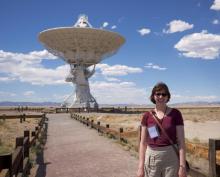
Dr. Deborah Good (University of Connecticut & Flatiron Institute) will give a colloquium in the Physics Department on pulsar astronomy. This lecture is open to the campus community, but assumes at least 1-2 years of physics background coursework.
Title: Building a Galactic Scale Gravitational Wave Detector
Abstract:
Pulsars are rapidly rotating, highly magnetized neutron stars, the remnants of massive stars following their supernova explosions. Millisecond pulsars (MSPs) are a sub-class of pulsars with short periods and very stable rotation, allowing timing precision of hundreds of nanoseconds over a decade. Since their discovery, pulsar observations have taught us about the neutron stars themselves, and MSPs have been particularly important for testing general relativity. One application of MSP timing to gravitational physics is the pulsar timing array (PTA), which uses long-term timing observations of many MSPs to search for a gravitational wave background sourced by the cosmic merger history of supermassive black holes. In this talk, I will discuss the basics of pulsar timing, how we use pulsar timing data to detect gravitational waves, and I will provide a summary of recent PTA results and upcoming directions.


